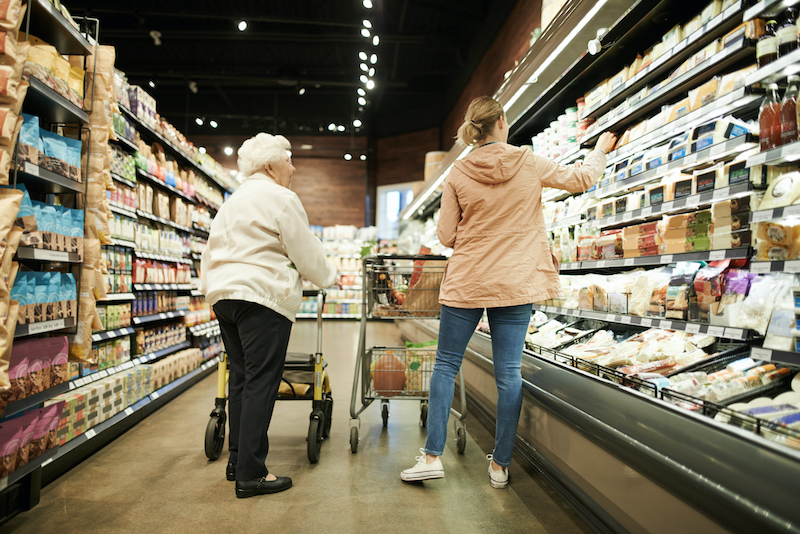As we age, we change – as does the world we live in. There are new challenges brought about by a lessening of physical abilities and new and different ways of doing things. Both of these changes may be evident to caregivers and adult children that help seniors with shopping.
Grocery shopping, for example, can be physically demanding for seniors, requiring:
- Lifting heavy bags
- Bending down or reaching up for items
- Reading small labels
- Pushing shopping carts
- Walking and standing for long periods of time with no place to rest
- Traveling to and from the grocery store
And now there are self-checkout stations and debit and credit card machines at checkout counters, food labels to read, and a vast and complex array of choices. (Take for example the Eggo waffle. In the early 1970s, there was one type of Eggo waffle. Today, there are 11 varieties.)
But grocery shopping is important for senior health as well as enhancing their sense of independence. Fresh, nutritious food is a must for everyone, and the ability to find it and buy it is the mark of an independent person.
Other shopping experiences have changed over the years as well. Buying a pair of shoes in the 1960s meant going to a shoe store and waiting for a clerk to measure your feet. Then she or he would disappear into the storeroom to find your size in the model you selected (and probably bring a few additional styles back to you). The clerk would put your shoes on you, and let you walk around until you made your decision. Today, in many stores, you are your own shoe clerk.
Now it is recommended that people do their shoe research online, but buy in the store. And many manufacturers are catering to the fashion and functional needs of senior footwear.
So how can adult children and caregivers help their loved ones navigate and adjust to today’s shopping experiences?
How to Help With Grocery Shopping
Some preliminary organization can reduce stress and the time it takes to shop. Here are some tips for seniors, adult children and caregivers when it comes to grocery shopping:
Preplan meals, and then make a grocery list and stick to it. Wandering and visiting every aisle is exhausting, and tends to be wasteful and more expensive.
Buy only the quantities needed. However, buying larger quantities of frozen food or staples that will last for a long while is a good idea.
Help seniors browse grocery store ads for bargains. Food costs are a major concern for many seniors, and using coupons to obtain needed items saves money.
Encourage early hour shopping for seniors when the stores are less crowded. Some may restrict an hour or so to only senior shoppers.
Accompany a senior who may need assistance in the store. This makes selecting food items easier, managing the checkout experience more pleasant, and loading and unloading the car less of a burden.
Look for stores with motorized carts if mobility is a challenge.
Focus on nutrition. That generally means doing the bulk of the shopping around the outer aisles of the grocery store, which is where the fresh vegetables and produce is kept, rather in the middle aisles where unhealthy processed foods lurk.
Help seniors find and use shopping and delivery services. During the COVID-19 pandemic, online grocery shopping has been a tremendous help, particularly for seniors. Adult children and caregivers can assist with placing orders until seniors become more comfortable with the process.
Online Shopping: An Amazing Variety
While shopping online may be an adjustment for some seniors, the COVID-19 pandemic has encouraged more seniors to shop online for a variety of items, with online shopping up 60 percent from last year for people 65 and older.
And almost everything from A-1. Steak Sauce to Zesters can be purchased online. Also, pharmacies now deliver medications to the homes of seniors.
- Online ordering includes a growing number of meal delivery services.
- There are online companies that specialize in clothing for seniors.
- Pet supplies can also be purchased online.
- Online garden supplies are also available.
Acquainting a senior with the world of online shopping can open up a whole new world for them. But seniors should be aware of security risks that can come with online shopping. It’s important for them to know how to manage online security, be aware of scams, and understand how management order systems work.
Security recommendations include:
Create a secure password. Use at least eight characters with a combination of upper and lowercase letters, and numbers and symbols. Change passwords regularly.
Shop from secure retailers only. Online shop only from websites that begin with “https” rather than just “http.” An easy way to remember this is that the “s” means secure. These sites have an added layer of data protection to ensure that your information is transmitted directly to the retailer—and only to the retailer.
Never give out a social security number. This shouldn’t be required for simple online purchases.
Don’t shop on a public computer. Using a public computer such as at a library or hotel isn’t a good idea. If the senior doesn’t logout, the next user will have access.
Pay with a credit card, not a debit card. Most credit cards offer fraud protection. Most debit cards don’t.
Take a look at Bethesda’s blog for more caregiver tips.
| Bethesda has a 133-year tradition of providing excellent senior living options, including independent living, assisted living, memory care, and skilled nursing. If you are considering independent living, we welcome you to tour one of our exceptional communities, including Bethesda Barclay House – Clayton, Bethesda Gardens – Kirkwood, Bethesda Orchard – Webster Groves, Bethesda Terrace – South County, Village North Retirement Community – Florissant, and The Oaks at Bethesda Villas – Kirkwood/Webster. Discover the level of care only a non-profit staffed by highly-trained nurses, therapists, and aids can offer. |
Want to find out more?
If you’d like to stay up to date with Bethesda Health Group, sign up here to receive our blog and newsletters!
"*" indicates required fields
Related Articles
Want to find out more?
If you’d like to stay up to date with Bethesda Health Group, sign up here to receive our blog and newsletters!
"*" indicates required fields



